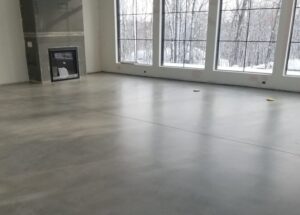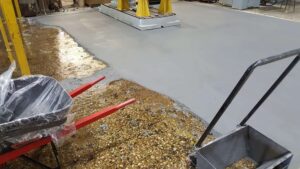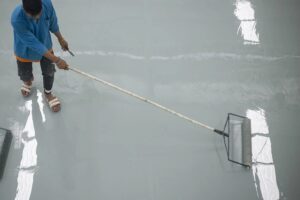Commercial Epoxy Flooring

- Affordable Pricing
- Experienced Contractors
- Guaranteed Warranty
- Friendly Customer Service
What is Commercial Epoxy Flooring?
Commercial epoxy flooring is a seamless, high-performance surface material often utilized in industrial and commercial settings for its durability, resilience, and aesthetic appeal. At its core, epoxy is a combination of two primary components: a resin and a hardener. When mixed together, a chemical reaction occurs that transforms the liquid mixture into a solid, plastic-like substance. This transformation is called polymerization. Due to this unique chemistry, once the epoxy is applied and cured, it forms a rigid and robust layer that adheres strongly to the underlying substrate, such as concrete.
But what sets commercial epoxy apart from residential or other types of coatings? The answer lies in its meticulously formulated chemical makeup, optimized for high-traffic and demanding environments. These coatings often incorporate additional materials, such as quartz or metallic pigments, to enhance both their visual appeal and performance attributes. This science-backed formulation results in a flooring solution that resists wear and tear, chemical degradation, and impact damage. Furthermore, its non-porous nature makes it impermeable to liquids, reducing the chance of slips and falls and making cleaning a breeze. With its perfect blend of science and utility, commercial epoxy flooring offers potential customers a lasting investment in their space’s appearance and functionality.
Types of Commercial Epoxy Flooring We Install

- Self-Leveling Epoxy Floors: Perfect for old, cracked, or damaged concrete floors, this type of epoxy creates a seamless, level surface. The self-leveling system is known for its ability to offer a smooth and durable surface, making it popular in commercial areas, warehouses, and showrooms.
- Quartz-Filled Epoxy Floors: These systems blend high-performance epoxy polymer resin with colored quartz grains. The resulting surface is decorative, sanitary, and slip-resistant, making it suitable for locker rooms, schools, cafeterias, and more.
- Epoxy Flake Floors: Epoxy flake floors contain colored flake materials that are sprinkled into the wet epoxy to provide a vibrant, multi-hued, and textured appearance. The flakes also offer a slight anti-slip texture, ideal for commercial kitchens, garages, and clinics.
- Metallic Epoxy Floors: A special additive is mixed with the epoxy resin to produce a shiny, metallic look. Each floor is unique, often resembling scenes of nature like molten metal or waves. It’s a favorite in retail establishments, lobbies, and showrooms due to its striking appearance.
- Anti-Static Epoxy Floors: In environments where a static-free operation is crucial (like electronics manufacturing or hospitals), anti-static epoxy flooring is used. It contains a conductive compound that accumulates static electricity to drain, ground, or dissipate any potential discharge.
- Mortar Epoxy Floors: Recognized as the strongest epoxy floors available, they are made of 100% solid epoxies combined with graded or quartz sand. They’re primarily used in heavy industry and areas that require extreme durability.
- Epoxy Terrazzo Floors: Modern and decorative, these floors are versatile in pattern and color, making them a preferred choice for large spaces, institutions, or commercial areas wanting a custom look. They combine chips of marble or granite with an epoxy resin, offering a mix of beauty and strength.
- Polyurethane and Polyaspartic Floors: While not technically epoxy, these coatings are sometimes used in conjunction with epoxy systems to offer additional benefits. Polyurethane is UV resistant and can prevent yellowing, while polyaspartic coatings are known for their rapid cure times and exceptional durability.
How to Maintain Your Commercial Epoxy Flooring



